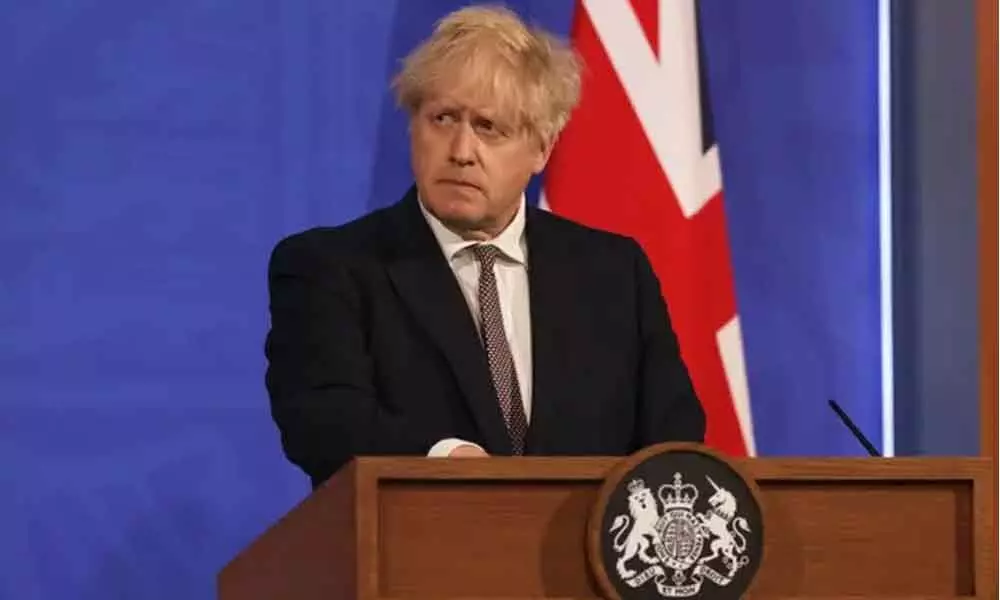Live
- Manu Bhaker applied for Khel Ratna but was shockingly overlooked: Sources
- Jagga Reddy's 'Prajasabha' in Sangareddy Postponed
- HYDRA Commissioner Ranganath Visits ORR, Inspects Multiple Lakes
- Improvement in Sriteja's Health Condition; Ventilator Removed and Liquid Diet Administered
- Former SC judge V. Ramasubramanian appointed as NHRC Chairperson
- Shyam Benegal: A true inspiration for aspiring film-makers
- Heavy snow forecast in Japan through Tuesday
- Legendary film-maker Shyam Benegal is no more
- Hackers steal over $12.7 billion in over 1,000 crypto heists to date
- BGT: 'Rohit is short of confidence with self-doubts', opines Manjrekar
Just In
A Scottish headache for Boris Johnson


A Scottish headache for Boris Johnson
The Scots are back. They are back with a bigger margin now. That is no good news for either the British or the European Union whose politics are going...
The Scots are back. They are back with a bigger margin now. That is no good news for either the British or the European Union whose politics are going to be rocked for more years now because of the pro-independence groups led by Nicola Sturgeon's Scottish National Party (SNP) which expanded their majority in the country's parliament, setting up a clash with the British government on whether Scots should be allowed a vote on leaving the 314-year-old union.
Sturgeon's SNP secured the largest number of seats — nearly half the total — in the country's multiparty, European-style proportional electoral system after pitching independence as a way to accelerate Scotland's recovery from the Covid-19 pandemic.
A referendum could also chart a path for Scotland back into the European Union after Britain left the trade bloc at the start of the year, supporters said. The SNP fell one seat short of an outright majority, indicating the divisiveness of the independence debate in Scotland and handing British Prime Minister Boris Johnson an excuse to refuse a referendum.
Only the U.K. government has the authority to sanction a vote. But the nationalists' ranks were bolstered by growing support for the Scottish Green Party, which also campaigned for independence, setting the stage for a protracted standoff. Together they have a majority of 72 seats in the 129-member legislature, an increase from the last vote five years ago.
Sturgeon, who is Scotland's first minister, or government leader, wasted little time laying out her plans to force a vote sometime in the next five years. In a series of interviews, she warned Johnson against using his legal powers to block a rerun of a previous 2014 referendum, which the nationalists lost.
Once the immediate Covid-19 crisis has passed, Sturgeon said she and her allies in the Greens will legislate for a new referendum in the Scottish parliament, effectively daring their counterparts in the British parliament at Westminster to stop them. It is more like saying if Brexit is possible, then a new referendum should also be for the Scots.
In the 2014 referendum, Scots rejected independence by a decisive margin, 55 per cent to 45 per cent. That was supposed to resolve the issue for a generation but two years later came the Brexit vote, and that radically altered the landscape. History has strange ways of either repeating itself or throwing back surprises. This one is similar. While England voted to leave the European Union, 62 per cent of Scottish voters wanted to stay.
With only about a tenth the population of England, Scotland was badly outnumbered and its preference was simply ignored. Resentments over that have helped revive the push for what is widely known as "indyref2."
Then there is the dominating personality of Prime Minister Boris Johnson. Already widely disliked in Scotland, he did nothing to endear himself by steadfastly championing a hardline version of Brexit, finally "getting it done," as he liked to say, when 2021 rolled in.
The resultant disruption to exporters, and particularly to Scotland's important fish and shellfish industries, which relied heavily on friction-free trade with the European Union, has further angered Scots. It must be admitted that Johnson is treating the Scots unequally and as second rate citizens. Scots should have been independent long ago. Well, tough times ahead for Johnson!

© 2024 Hyderabad Media House Limited/The Hans India. All rights reserved. Powered by hocalwire.com






